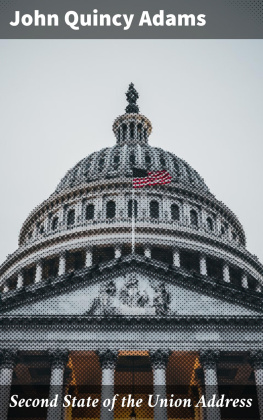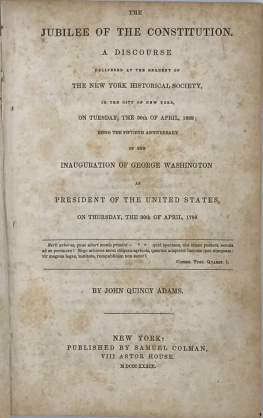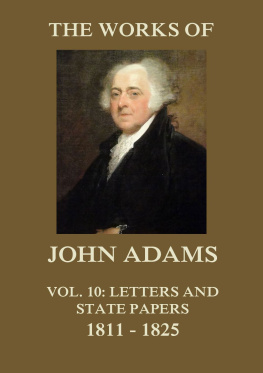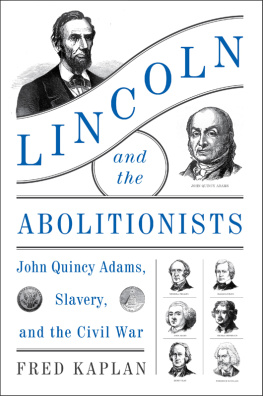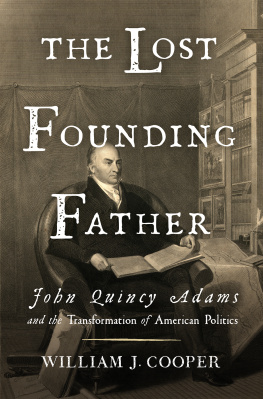State of the Union Addresses of John Quincy Adams
The addresses are separated by three asterisks: ***
Dates of addresses by John Quincy Adams in this eBook:
***
State of the Union Address
John Quincy Adams
December 6, 1825
Fellow Citizens of the Senate and of the House of Representatives:
In taking a general survey of the concerns of our beloved country, with reference to subjects interesting to the common welfare, the first sentiment which impresses itself upon the mind is of gratitude to the Omnipotent Disposer of All Good for the continuance of the signal blessings of His providence, and especially for that health which to an unusual extent has prevailed within our borders, and for that abundance which in the vicissitudes of the seasons has been scattered with profusion over our land. Nor ought we less to ascribe to Him the glory that we are permitted to enjoy the bounties of His hand in peace and tranquillity--in peace with all the other nations of the earth, in tranquillity among our selves. There has, indeed, rarely been a period in the history of civilized man in which the general condition of the Christian nations has been marked so extensively by peace and prosperity.
Europe, with a few partial and unhappy exceptions, has enjoyed ten years of peace, during which all her Governments, what ever the theory of their constitutions may have been, are successively taught to feel that the end of their institution is the happiness of the people, and that the exercise of power among men can be justified only by the blessings it confers upon those over whom it is extended.
During the same period our intercourse with all those nations has been pacific and friendly; it so continues. Since the close of your last session no material variation has occurred in our relations with any one of them. In the commercial and navigation system of Great Britain important changes of municipal regulation have recently been sanctioned by acts of Parliament, the effect of which upon the interests of other nations, and particularly upon ours, has not yet been fully developed. In the recent renewal of the diplomatic missions on both sides between the two Governments assurances have been given and received of the continuance and increase of the mutual confidence and cordiality by which the adjustment of many points of difference had already been effected, and which affords the surest pledge for the ultimate satisfactory adjustment of those which still remain open or may hereafter arise.
The policy of the United States in their commercial intercourse with other nations has always been of the most liberal character. In the mutual exchange of their respective productions they have abstained altogether from prohibitions; they have interdicted themselves the power of laying taxes upon exports, and when ever they have favored their own shipping by special preferences or exclusive privileges in their own ports it has been only with a view to countervail similar favors and exclusions granted by the nations with whom we have been engaged in traffic to their own people or shipping, and to the disadvantage of ours. Immediately after the close of the last war a proposal was fairly made by the act of Congress of March 3rd, 1815, to all the maritime nations to lay aside the system of retaliating restrictions and exclusions, and to place the shipping of both parties to the common trade on a footing of equality in respect to the duties of tonnage and impost. This offer was partially and successively accepted by Great Britain, Sweden, the Netherlands, the Hanseatic cities, Prussia, Sardinia, the Duke of Oldenburg, and Russia. It was also adopted, under certain modifications, in our late commercial convention with France, and by the act of Congress of January 1st, 1824, it has received a new confirmation with all the nations who had acceded to it, and has been offered again to all those who are or may here after be willing to abide in reciprocity by it. But all these regulations, whether established by treaty or by municipal enactments, are still subject to one important restriction.
The removal of discriminating duties of tonnage and of impost is limited to articles of the growth, produce, or manufacture of the country to which the vessel belongs or to such articles as are most usually first shipped from her ports. It will deserve the serious consideration of Congress whether even this remnant of restriction may not be safely abandoned, and whether the general tender of equal competition made in the act of January 8th, 1824, maynot be extended to include all articles of merchandise not prohibited, of what country so ever they may be the produce or manufacture. Propositions of this effect have already been made to us by more than one European Government, and it is probable that if once established by legislation or compact with any distinguished maritime state it would recommend itself by the experience of its advantages to the general accession of all.
The convention of commerce and navigation between the United States and France, concluded on June 24th, 1822, was, in the understanding and intent of both parties, as appears upon its face, only a temporary arrangement of the points of difference between them of the most immediate and pressing urgency. It was limited in the first instance to two years from January 10th, 1822, but with a proviso that it should further continue in force 'til the conclusion of a general and definitive treaty of commerce, unless terminated by a notice, six months in advance, of either of the parties to the other. Its operation so far as it extended has been mutually advantageous, and it still continues in force by common consent. But it left unadjusted several objects of great interest to the citizens and subjects of both countries, and particularly a mass of claims to considerable amount of citizens of the United States upon the Government of France of indemnity for property taken or destroyed under circumstances of the most aggravated and outrageous character. In the long period during which continual and earnest appeals have been made to the equity and magnanimity of France in behalf of these claims their justice has not been, as it could not be, denied.
It was hoped that the accession of a new Sovereign to the throne would have afforded a favorable opportunity for presenting them to the consideration of his Government. They have been presented and urged hither to without effect. The repeated and earnest representations of our minister at the Court of France remain as yet even without an answer. Were the demands of nations upon the justice of each other susceptible of adjudication by the sentence of an impartial tribunal, those to which I now refer would long since have been settled and adequate indemnity would have been obtained.
There are large amounts of similar claims upon the Netherlands, Naples, and Denmark. For those upon Spain prior to 1819 indemnity was, after many years of patient forbearance, obtained; and those upon Sweden have been lately compromised by a private settlement, in which the claimants themselves have acquiesced. The Governments of Denmark and of Naples have been recently reminded of those yet existing against them, nor will any of them be forgotten while a hope may be indulged of obtaining justice by the means within the constitutional power of the Executive, and without resorting to those means of self-redress which, as well as the time, circumstances, and occasion which may require them, are within the exclusive competency of the Legislature.
It is with great satisfaction that I am enabled to bear witness to the liberal spirit with which the Republic of Colombia has made satisfaction for well-established claims of a similar character, and among the documents now communicated to Congress will be distinguished a treaty of commerce and navigation with that Republic, the ratifications of which have been exchanged since the last recess of the Legislature. The negotiation of similar treaties with all of the independent South American States has been contemplated and may yet be accomplished. The basis of them all, as proposed by the United States, has been laid in two principles--the one of entire and unqualified reciprocity, the other the mutual obligation of the parties to place each other permanently upon the footing of the most favored nation. These principles are, indeed, indispensable to the effectual emancipation of the American hemisphere from the thralldom of colonizing monopolies and exclusions, an event rapidly realizing in the progress of human affairs, and which the resistance still opposed in certain parts of Europe to the acknowledgment of the Southern American Republics as independent States will, it is believed, contribute more effectually to accomplish. The time has been, and that not remote, when some of those States might, in their anxious desire to obtain a nominal recognition, have accepted of a nominal independence, clogged with burdensome conditions, and exclusive commercial privileges granted to the nation from which they have separated to the disadvantage of all others. They are all now aware that such concessions to any European nation would be incompatible with that independence which they have declared and maintained.

